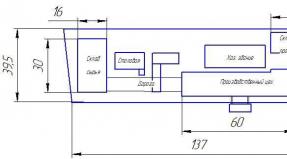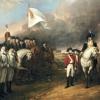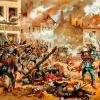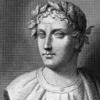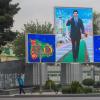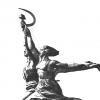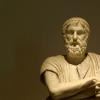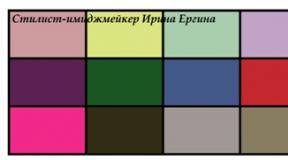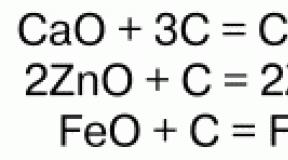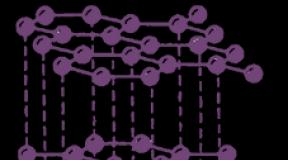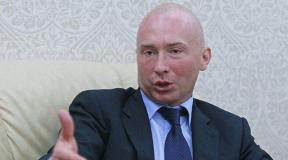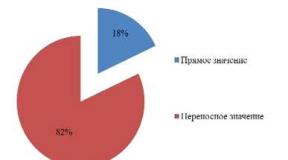Biography. Zakhar Prilepin's friendly family Zakhar Prilepin's biography summary
He is not only a fashion writer, but also an exemplary family man - monogamous with four children. But there were in the life of Zakhar and an abandoned university, and work as a loader, and Chechnya ...
Zakhar Prilepin with his wife and children. Photo: personal archive of Zakhar Prilepin.
Prilepin's first novel, Pathologies, brought him fame and several literary awards. It was exactly ten years ago. Now on the shelves of his eleventh book in a row - "The Abode". And it is hard to imagine that there was a time when no one even heard such a name - Zakhar Prilepin! However, at birth he was named Eugene. Zakhar is a creative pseudonym. By the way, the village relatives by no means could have foreseen that the boy would become a world-famous writer. According to Prilepin himself, they didn’t expect much from him at all. He was strange, he read poetry all the time, and even aloud ... My father worked as a village teacher, my mother worked as a nurse. In the village of Ilyinka, in the Ryazan province, the future "ruler of thoughts" lived with his parents and sister until he was nine years old. Then the family moved to the “capital of chemistry and other contagion there” (local folklore) - to the city of Dzerzhinsk, Nizhny Novgorod province. A colorful "capital", encircled by chemical plants, shrouded in gas smog in the Soviet years ... Zakhar says that he felt like an adult when, as a teenager, he lost his father. Looked at the world differently. Without illusions. However, he acted like a true poet with his future: he let it take its course, trusting his impulses and feelings. So, he left the philological faculty of the university. So, he signed up for the OMON, rose to the rank of commander, went to fight in Chechnya. Returning from the war and to civilian life, he was restored at the university. At one of the exams, he met his future wife Masha, whom he is still in love with ... By the way, Prilepin's monogamy and many children are no less amazing than Chechnya and OMON. Four children! Two sons and two daughters. A house full of animals (cats and a dog), open to friends, "trained" by a talented mistress - pure happiness! Unexpected, even indecent for a writer. After all, a writer is supposed to suffer in his personal life: fall in love, be disappointed, destroy everything, fall in love again - and draw inspiration from this. Zakhar is different...
Do you believe the writers who seriously say that it is not they themselves who write, but they are allegedly being dictated to from above?
Zakhar Prilepin:“I hate such people and always want to beat them over the head with a stool. Because more often than not, people who write amazing bullshit say this in earnest. And it turns out - either God is a fool, or ... In general, there is clearly some kind of disorder. I don't hear any voices, nobody dictates anything to me. I write only myself and not with the blood of my heart, I just type words on a laptop, they are collected in sentences. Don't bleed..."
So you could not write at all?
Zakhar:“Probably could. I didn't write until I was thirty. And he lived well. In principle, I would prefer to sit on the beach with friends, drink beer and have bare-bellied children running around, a big Bumblebee dog ... All this is much more pleasant than writing. But sometimes I catch myself by the tail, because there are some important things that this type of activity gives. The feeling of being needed by a considerable number of people, usefulness... I have already received an insane number of letters - both from Russia and from other countries. Of course, it's wildly nice to know that you are very important to someone in life. So it's not a coincidence."

For many, you are not only an excellent writer, but also an example of a family man. By the way, once at a meeting with readers you said that you would like your family's experience to be broadcast throughout Russia ...
Zakhar:“Well, it was said with a bit of humor, the audience was pleasant, friendly, so I allowed myself ... After each such phrase, there should have been a smiley face. (Laughs.) Why take an example from me? Well, my wife and I made a certain number of children, but the rest is the same story. (Laughs.)
However, not the same.
Zakhar:“You see, the family is also my job. There is work related to books, but it seems to be not the main one. Somehow, my friend Sasha Veledinsky (and he is a director, screenwriter, makes films) was asked by journalists: who do you think you are? Meaning, perhaps, the profession. Him: father. And I suddenly realized that if they also ask me who I feel like - a writer, a publicist, a journalist - I will answer the same way: a father. Because I can stop any of my activities for a long time, maybe for years. Once upon a time I wrote poetry, then I stopped, and this question does not interest me at all today. It may be the same with prose. With journalistic activity - all the more so, I've been tired of it for a long time. But what concerns my family, my children ... It will always be. Because this is the main feeling of my life. Remember how Yesenin said: “How terrible that the soul passes, like youth and like love.” The soul passes like everyone else. And the surest way to preserve your human being, your human worth, is the family and everything connected with it.
It is unlikely that you thought about all this when you got married. You were young and just fell in love with the right person. So?
Zakhar:“Yes, it just happened. Apparently, intuition worked well for both my wife and me. We sometimes laugh about it. Somewhat ironic, some not. I remember that when we met, I worked in the riot police. Ordinary riot policeman, then squad leader. In any case, some kind of breakthrough into other areas was not expected.

Was the groom unpromising?
Zakhar:"Yes. Masha was engaged in some kind of business, she was one of the first business women in Nizhny Novgorod. She didn’t do something grandiose - she just thought quickly, thought quickly, bought something, resold something, rented some offices, then rented them out. In any case, all this was already working for her in the nineties. And suddenly she abandons her well-established business and connects her life with an riot policeman. To the surprise of all my friends. Masha's mother (already deceased, unfortunately) was a wonderful person, but she was also puzzled that her daughter no longer brings money to the family. (Laughs.)
However, the choice was correct. You are an ideal husband, you manage to write books and raise children. It's probably more difficult with girls, isn't it?
Zakhar:“Girls are much easier. That is, it’s easy for me and my sons. We all get along great. In the summer I lived with four children in the countryside. Actually, I do it every summer, while my wife is resting a bit. And no problem. If I didn’t have so many trips, I would generally live all year round with my children in the countryside. It is clear that they need to study, and so I cope with everyday life easily. But the girls are more deployed to the father, of course. And the boys are more to the mother. I felt it clearly at some point. If we sit down at the table with guests and there are few places, the youngest son always sits on his mother's lap - op! And my daughter is with me. Well, the youngest, she turned three, she can still go back and forth. But those who are older are apparently looking for some patterns of male or female behavior. To better understand ... And the elder is already a completely separate person. He's sixteen."
Father, you are experienced. Are you also called a young writer? You've been in literature for ten years.
Zakhar:“I kept thinking that I was a young prose writer. But it turned out - no longer. Russia has generally returned to its former gradations of age. And then, after all, in the nineties, due to the fact that there was a wave of returned prose, Pelevin, Sorokin, Tatyana Tolstaya, Yuri Polyakov went to the young ... And they were already forty or forty-five years old. But really young writers then practically did not appear. The time was somehow not favorable. Remember, Yesenin wrote in 1923: “I feel like the master of Russian poetry”? He was twenty eight. What young poet would say that now? Pushkin at thirty-three or at thirty-four was already included in literature textbooks! And similar things are happening today. My works are also held at school. So I decided to brag."

And who, from your point of view, is today a promising young prose writer?
Zakhar:“Let's say Sergey Samsonov. He is from Peter. He has already written several novels. The book called "Kamlaev's Anomaly" turned out very well. And he's really young - thirty years. I compiled an anthology of contemporary male prose of the 2000s. It's called "Ten". And there everything is plus or minus - from twenty-eight to forty-two. All prose writers. Ten people. And then I published another anthology, women's prose, called Fourteen. It turned out that there are more good prose writers among women. Who? Alisa Ganieva, Polina Klyukina... We have a place for the reader's eye to roam. And there are many good young poets. But I'll tell you a little about something else. In general, the perception of the world by young writers is not even skeptical, but apocalyptic, it is very difficult. And literature has always been such a thermometer, measuring "body temperature". And now, judging by the literature, we are definitely not all right.”
Will the Book Reader, which you called a guide to the latest literature with lyrical and sarcastic digressions, have a sequel?
Zakhar:“It will definitely. Because I actually read a lot of books. Most often on airplanes. That's when they say, they say, there is no time for reading, it's not true. There is always time. At least when we travel by public transport. Of course, it is much more necessary and important for a person to read a book than to spend forty hours on the Internet. I also sometimes go to social networks and hang out for a long time. You know, it only seems to us that we live in the information age and we understand something so important from an endless news feed. All wrong. For example, you can read all the newspapers from the year when Anna Karenina was written, or you can read Anna Karenina, and this will give a person much more than all the newspapers. So now. I've seen some friends, heard in the social network, and I feel good. But when I sit there for four hours, then I crawl out like a bum from a garbage can. What was I doing there? Unclear. But I spent the same time reading the novel “The Germans” by Alexander Terekhov and immediately learned a lot about life, about love, about a woman, about Luzhkov. (Laughs.)
What are your plans besides "Book Reader"?
Zakhar: “After The Abode, there will be two collections of essays. And then I’ll probably sit down to make a book about music.”

By the way, where can I listen to your musical group Elefank?
Zakhar:“The Elefank group is not even from Nizhny Novgorod, it is all-Russian. The musicians with whom I am doing this project are of a very serious level. In part, this is a tribute to youth. Then music meant a lot - for me and for people of my generation. Elefunk is available on my website. Listen. I will be happy if you like it. First of all, for your comrades. Because I succeeded in everything in my life and even more than I expected, even more than my mother expected from me. And my musicians, who play so well, they have… as they say, karma. Karma destroyed by all sorts of divorce proceedings, abandoned children, drunkenness, drug addiction, everything else. And I hope to pull them all out with my bright karma ... This is my personal experiment. Maybe it won't work."
Do you watch movies?
Zakhar: I've watched Alan Parker's Angel Heart forty times. He shocked me when I was young. I will not say that I am a great specialist in this field, but I have seen many good films. A few days before Herman's death, I wrote in an article that I watched all of his paintings three or four times, except for Khrustalev. Herman's films fascinate me, they live in me as a part of me. Some heroes from there are more real to me than living people. For a long time I had a very bad attitude towards modern Russian cinema, until I became friends with Dunya Smirnova. And she, for her part, said that we have a very bad modern Russian literature. Me: "Dunya, now I will write you a list of ten books, you will read them and say that you are wrong." And I wrote a list. She read. After that I heard: “Zakhar, I was a fool, I did not do what I should. I'm starting to read books again." You see, you just need to have a good guide. Dunya also offered me ten films to choose from. And I watched Boris Khlebnikov’s Free Swimming, I watched Popogrebsky, Vyrypaev (I liked Euphoria more than Oxygen), Sergei Loban’s Big Top Show, Kirill Sereberennikov’s Treason ... I realized that every year we have comes out with some great pictures. Of course, there is also a huge amount of all sorts of cinematic rubbish, which is removed by some non-professionals and fools. But there are guys who do amazing work."
Is it important to wait for inspiration to sit down at your desk?
Zakhar:“I don't know this feeling. Without any coquetry. It is unfamiliar to me. Sometimes I think that I am not quite a real writer, because I have never experienced the voluptuous delight of what I create. Never. And it’s not that I start doing this with flour, but always with some, you know ... Thank God, in the village where I live, I don’t have the Internet, mobile communications and television, so I have nothing to do with myself. Everyone knows: when there is nothing to do, you need to run to your page on the social network for a minute and you can get stuck there for four hours. So what should I do in the countryside? I went for a walk with the dog, fed him, looked at the river and sat down to write. Sometimes already in the process there is a feeling that the work somehow drags along. Well, this is a well-known theme: first you drag a novel uphill to the middle, and then it rolls by itself. You just have to follow him."

And the heroes bend their line?
Zakhar:“You know, for a long time I perceived as a kind of coquetry the words of Leo Nikolayevich Tolstoy, they say, that's what Natasha Rostova did - she married Pierre Bezukhov. But this is true: sometimes the characters themselves change the plot. To put it simply, there are two types of writers: "Dostoevsky" and "Tolstoy". Dostoevsky is a writer of ideas. He has ideas, and they attract his novel and subordinate everything to themselves. Tolstoy also had many different ideas, but he is, roughly speaking, a writer of life. Everything that happens in his novels corresponds to the real life development of the individual. I am, of course, a writer of the "Tolstoy" type. The real model of human behavior, the movement of his spirit is more important to me than all my slanderous ideas. You noticed, let's say, that Dostoevsky's diaries and journalistic works and his novels do not enter into any contradiction, in many ways they are able to move one into the other. And the difference between Tolstoy's philosophical outlook and many of his texts is often simply enormous. Precisely due to the fact that Dostoevsky subordinates the narrative to his ideology, while Tolstoy cannot resist life. Let's say I wanted the novel "Sankya" to look like a manifesto of national Bolshevism. I myself am a revolutionary and desire an immediate man-made rebellion. But when I wrote this text, everything there came into conflict with this attitude of mine, and the novel turned out to be such that, say, Liya Akhedzhakova found in it, as she said, "a lot close to herself." And Sergei Yursky said the same thing. People who, before reading the novel, hated it all. One way or another, our liberal and any other intelligentsia, to my happiness, discovered some things in the novel that are understandable and organic to them. God forbid you think that I'm comparing, but this is how The Quiet Don was perceived at one time: both the Whites and the Reds considered it their novel.
What is your main sadness today?
Zakhar:“There is not enough time for family and children. And it needs to be enough. Because children grow up very fast. This is your great childhood - no end, no edge, but here ... I remember I was leaving once again, my youngest daughter Lily was just babbling, and when she returned - she already very clearly says “I won’t” for any reason. And I didn’t hear when it happened for the first time, and I’m offended. And always on some long trip, I dream that I’ll be back soon, lie down at home and spend all day writing and looking at them ... "
Where do you draw energy from?
Zakhar:“I think the whole point is that I don’t have any very serious claims to life. And because of them, a person, as a rule, takes away energy. I am always happy with everything. Like this since childhood. And the logic of the higher forces that endow us with all this is probably the following: since you are happy, then - on, here you have a little more strength. This is what I am trying to impress on my wife: be happy with everything, and everything will be fine. And we are all, thank God, all right. Although, I understand, we should not have had enough strength for four children. And I shouldn't have earned that money. When we gave birth to them, we were completely crazy people - half-poor. But every time we did these illogical, irrational actions, a new child appeared, the space of life somehow opened up more and more. There is a saying: every child is born with his own bread. And not only does the child with his own bread, but also falls to his parents - both bread and other benefits. And life is getting better and more fun. Now the last award has ended, and I think: maybe give birth to another one?
Name: Zakhar Prilepin.
Place of Birth: village of Ilyinka, Skopinsky district, Ryazan region.
Parents: Prilepin Nikolai Semenovich, history teacher.
Nisiforova Tatyana Nikolaevna, physician.
Place of residence: Russia, Nizhny Novgorod.
Education: UNN them. N. I. Lobachevsky, Faculty of Philology.
School of Public Policy.
Publications: published since 2003
Prose: "Friendship of Peoples", "Continent", "New World", "Cinema Art", "Roman-newspaper", "North".
Writer, actor, musician. Editor-in-Chief of the Free Press website. Secretary of the Writers' Union of Russia. Presenter of the author's program "Russian Lessons" on the NTV channel. Member of the Executive Committee of the All-Russian Popular Front. Deputy Artistic Director of the Moscow Art Theatre. M. Gorky.
In October 2019, Zakhar Prilepin creates the Public Movement "For the Truth". Since 2020 - Chairman of the For Truth party.
The Zakhar Prilepin Foundation provides humanitarian assistance to the residents of Donbass.
Books:
1. "Pathologies", a novel (2005)
2. Sankya, novel (2006)
3. "Sin", one life in several stories (2007)
4. Boots Full of Hot Vodka: Kid Stories (2008)
5. "I came from Russia", essay (2008)
6. “It concerns me personally”, essay (2009)
7. "Leonid Leonov: His game was huge", research (2010)
8. "Black Monkey", a story (2011)
9. "Eight", short stories (2011)
10. "Book Reader", a guide to the latest literature (2012)
11. Abode, novel (2014)
12. "Flying barge haulers", essay (2014)
13. "Not someone else's turmoil", essay (2015)
14. "Dissimilar poets: Mariengof, Lugovskoy, Kornilov", research (2015)
15. "Seven Lives", a collection of small prose (2016)
16. "Whatever Must Be Resolved...: A Chronicle of the Coming War", non-fiction (2016)
17. Platoon. Officers and militias of Russian literature" (2017)
18. Some Won't Go to Hell, fantasy novel (2019)
19. "Stories from an easy and instant life", essay (2019)
20. Yesenin. Promising a meeting ahead, ZhZL (2019)
Compiler of anthologies and collections:
1. “War. WAR" (2008, "ASTrel")
2. “Revolution. Revolution" (2009, "ASTrel")
3. “Name day of the heart. Conversations with Russian Literature" (2009, "ASTrel")
4. “Lit Perron. Anthology of Nizhny Novgorod poetry (2011, Books)
5. “Ten. Anthology of prose of the '00s' (2011, Ad Marginem)
6. "Lemon in jail." (2012, Centerpolygraph)
7. “14. Anthology of Women's Prose of the '00s' (2012, ASTrel)
8. Leonid Leonov. Collected works in six volumes (2013, "Terra")
9. Anatoly Mariengof. Collected works in three volumes (2013, "Terra")
10. Poets of the 20th century: Vasiliev, Yesenin, Kornilov, Lugovskoy, Mariengof. An anthology in five books (2015, Young Guard)
11. "Lemon in the war" (2016, Algorithm)
12. "I am a wounded earth" (2017, "Terra")
Filmography:
1. "Eva" (KMF, 2019) - Ukrainian oligarch, Eva's father.
2. "Duty" (KMF, military drama, 2017) - militia Cat.
3. "Gayler" (film, 2017) - Dima.
4. "THREAT: Trepalov and the Wallet" (TV series, 2016) - poet Vladimir Lugovskoy.
5. "Eight" (feature film, 2013) - a taxi driver.
6. "Inspector Cooper" (TV series, 2012) - Sergey Vasiliev, killer.
Screen versions:
- "White square"(director - Ivan Pavlyuchkov), 2012. Screen adaptation of the story "White Square". In 2012, the film received the Bronze Frame prize at the 12th International Short Film Festival Unseen Cinema in Maardu (Estonia) and the Grand Prix at the Metra International Film Festival (Russia).
- "Eight"(directed by Alexey Uchitel), 2013. Screen version of the story "Eight".
- "Fucking story"(directed by Mara Tamkovich, Poland) 2015. Short film based on the short story by Zakhar Prilepin "The Fucking Story".
- "Dog"(directed by VGIK graduate Ksenia Tishchenko), 2017. Short film based on the story of the same name by Zakhar Prilepin.
Discography:
- Zakhar Prilepin and the Elefank group - The Seasons (2011)
- Zakhar Prilepin and the Elefank group - "Coup" (2013)
- Rich and Zakhar Prilepin - "Pathologies" (2013)
- Zakhar Prilepin and the Elefank group - "Hunter" (2015)
- Rich and Zakhar Prilepin - "To the Ocean" (2016)
- Zakhar Prilepin and the Elefank group - Tsvetnoy (2019)
Awards:
Prize finalist:
- 2005: "National Bestseller" (novel "Pathologies")
- 2005: "Boris Sokoloff Prize" (novel "Pathologies")
- 2006: "Russian Booker" (novel "Sankya")
- 2006: "National Bestseller" (novel "Sankya")
- 2006: Diploma of the Eureka Prize (novel Sankya)
- 2007: im. Y. Kazakova - for the best story of the year (story "Sin")
- 2009: im. I. A. Bunina - for the book of journalism "Terra Tartarara: This concerns me personally"
- 2012: Big Book (Black Monkey novel)
- 2014: "Russian Booker" (novel "Abode")
Prize Winner:
- 2005: BRF Prize "Inspire Paris"
- 2006: "Roman-gazeta" award in the "Discovery" nomination
- 2007: All-China Literary Award "Best Foreign Novel of the Year" - Sankya novel
- 2007: Award "Exclusive of the Year" of the site Nazlobu.ru for political journalism
- 2007: Yasnaya Polyana Prize "For an outstanding work of contemporary literature" (novel "Sankya")
- 2007: "Faithful Sons of Russia" award (for the novel "Sin")
- 2008: "Soldier of the Empire" award - for prose and journalism
- 2008: National Bestseller Award (novel Sin)
- 2008: OZON.RU Bestseller Award - according to the results of sales in the OZON.RU online store
- 2009: "Art person" of the year according to the radio station "Europe plus"
- 2010 National Award "Best Books and Publishing Houses-2010" in the "Biographies" section - for the book "Leonid Leonov: His game was huge"
- 2011: SuperNational Best Award ($100,000 for Best Prose of the Decade)
- 2011: GQ Writer of the Year
- 2012: "Bronze Snail" (2012) in the "Large Form" nomination for the best fantasy novel of the year - "Black Monkey".
- 2012: Man of the city (Nizhny Novgorod).
- 2012: BookMix.ru award in the nomination "Expert's Choice" (novel "Black Monkey")
- 2014: Book of the Year Award for The Abode (Annual National Competition)
- 2014: "Runet Book Prize-2014" in the nomination "Best Fiction Book" (the novel "Abode")
- 2014: Big Book Award (novel The Abode)
- 2014: Nizhny Novgorod regional award "Awakening" in the nomination "Leader of the Year"
- 2014: "Alexander Ivanovich Herzen Prize" (for the book "Peresvet is coming to us")
- 2015: "Vadim Valeryanovich Kozhinov Prize" (for "Notes from Novorossiya", social and literary activity)
- 2015: Zakhar Prilepin became the winner of the Yesenin Prize
- 2015: Zakhar Prilepin's novel "Abode" became the winner of the IV contest "Auditor - 2015" in the nomination "Customer's Choice. Publisher of the bestseller in paper form"
- 2017: Ivo Andrić Prize (Serbia) for the books "The Abode" and "Seven Lives"
- 2017: Prize of the Government of the Russian Federation for achievements in the field of culture
- 2017: awarded with the Donbass Volunteer Cross
- 2017: awarded the highest award of the International Slavic Literary Forum "Golden Knight" (Irkutsk) - gold medal named after. A.S. Pushkin
- 2017: became a laureate of the Alexander Nevsky Prize. The writer was awarded the first prize for the book “Platoon. Officers and militias of Russian literature.
- 2018: Award "For the preservation of the traditions of the Russian literary school, educational and social activities."
- 2018: The military drama "On Duty" (KMF) won the main prize of Best Narrative Short at the Tribeca Film Festival in New York and became an Oscar contender. Director - Lenar Kamalov, starring - Zakhar Prilepin.
- 2018: Laureate of the international prize of the city of Cassino "Letterature dal fronte" for the novel "Pathologies" (Italy).
- 2018: Laureate of the Lermontov Prize in the nomination "For achievements in literary work that has received public recognition" for the books "Dissimilar Poets" and "Platoon".
- 2018: Laureate of the international award "Person of the Year - 2018". Humanitarian activity. Donbass.
- 2020: Winner of the national award "Best Books and Publishers of the Year" in the category "Fiction" for the novel "Some won't go to hell".
The French edition of Zakhar Prilepin's Pathologies won the prestigious Russophonie award in France for the best translation of a Russian book.
The film "White Square" (directed by Ivan Pavlyuchkov) received the "Bronze Frame" prize at the 12th International Short Film Festival "Unseen Cinema" in Maardu (Estonia) and the grand prix at the international film festival "Metra" (Russia).
Zakhar Prilepin's works have been translated into 25 languages: English, Arabic, Armenian, Bulgarian, Hungarian, Vietnamese, Greek, Danish, Italian, Spanish, Chinese, Latvian, Moldavian, German, Norwegian, Polish, Romanian, Serbian, Slovak, Slovenian, Ukrainian, Finnish, French, Czech, Japanese.
Books by Zakhar Prilepin are included in the curriculum of Russian liberal arts universities. The textbook “History of Russian Literature of the 20th Century” published in 2013 (recommended by the Ministry of Education and Science, is the first textbook that fully complies with the Federal State Standard) introduces a separate chapter on Zakhar Prilepin, which completes the course of modern literature.
Activity: journalist (previously: handyman, security guard, loader, commander of the OMON department, etc.)
Family status: happily married.
Achievements: four children.
Beliefs: national Bolshevik, patriot.
Likes:
Prose:
Gaito Gazdanov: "Evening at Claire's", "Night Roads", "Ghost of Alexander Wolf"
Romain Gary: Promise at Dawn
Boris Zaitsev: "Golden Pattern"
Thomas Mann: "Joseph and his brothers"
Henry Miller: "Sexus"
Anatoly Mariengof: "Cynics"
Vladimir Nabokov: "Hell or the Joy of Passion"
Leonid Leonov: Pyramid, Thief, Road to the Ocean, Evgenia Ivanovna
Eduard Limonov: “It's me, Eddie”, “Diary of a Loser”
Alexander Prokhanov: "Palace", "Third Toast"
Mikhail Tarkovsky: "Frozen Time"
Alexander Terekhov: "Stone Bridge", "Babaev"
Jonathan Franzen: "The Amendments"
Mikhail Sholokhov: Quiet Flows the Don
Russian classics of the 19th century, PSS.
Poetry:
Cesar Vallejo, Pavel Vasiliev, Sergei Yesenin, Eduard Limonov, Boris Ryzhiy.
Russian Silver Age. Greek poetry of the 20th century. Latin American Poetry of the 20th Century.
tunes:
Marc Almond - "Enchanted", "Open All Night"
Cure - "Kiss Me, Kiss Me, Kiss Me", "Disintegration"
Manu Chao - Proxima Estacion. Esperanza"
50 cent - "Get Rich Or Die Try"
Aquarium - "Radio Africa", "Russian Album"
Alexander Bashlachev - "Eternal Fast"
Alexander Dolsky - "The State of Blue Eyes", "Portrait in a Frame"
"Machine Band" - "Bomb"
As well as:
- A-ha, Nick Cave, Depeche Mode, Rob Dougan, Marley & Sons, Sinead O'Connor.
- "25/17", "Auktyon", Mikhail Shcherbakov, Elena Frolova.
Cinema:
Angel Heart, dir. Alan Parker
Among the Gray Stones, dir. Kira Muratova
Favorite quote:
"Am I my brother's keeper?" (Cain).
“They said that I insulted the Queen of Prussia, not at all. I just told her: "Woman, go back to your spinning wheel and household." I have nothing to reproach myself with. I ordered her favorite Hatzfeld to be released, otherwise they would have shot him ”(Napoleon).
“If you die, you will know everything; or stop asking" (Leo Tolstoy).
Based on interviews and publications by Zakhar Prilepin.
Today he is a welcome guest everywhere — with his songs on the rock scene, with his books at a literary evening, with sharp polemical attacks in articles and on the front pages of newspapers, with provocative publications on social networks, with humanitarian aid in bombed-out villages in Donbass. You can disagree with him, but it is impossible to deny him his talent: with a word or personal example, he straightens people's shoulders, restores their dignity and the ability to walk with their heads held high on their land.
Zakhar Prilepin (according to his passport, Evgeny Nikolaevich Prilepin) is a Russian writer, journalist, and musician. Born in the village of Ilyinka, Skopinsky district, Ryazan region, in the family of a teacher and a nurse. Graduated from the Faculty of Philology of the Nizhny Novgorod State University and the School of Public Policy. He worked as a journalist, handyman, security guard, loader, served as the commander of the OMON department, took part in the hostilities in Chechnya in 1996 and 1999.
Already the first novel "Pathology", published in 2005, brought Prilepin wide popularity, and the novel "Sankya", published a year later, made the author a cult figure in modern Russian prose. Prilepin is a laureate of prestigious international and Russian awards in the field of literature. The writer's works have been translated into 20 foreign languages. Films are made based on Prilepin's books, performances are staged, he himself actively tours with the Elefank group.
By his own admission, Zakhar Prilepin is happily married, and lists four children among his most important achievements.
- In his works, the writer often endows the characters with their own traits. Did something from your parents find reflection in your works?
- It is difficult to play with such things as parents, I hardly would. You can crush, refract, modify, improve, worsen your biography and yourself. But with your parents you will not have fun like that. For example, the father in the story "Forest" is really my father, and the grandfather in "Sin" is my grandfather, Semyon Zakharovich Prilepin. And my grandmother is also there, the real one. They were such colorful people, I loved them so much, they had such diverse, complex feelings that there was no need to draw any monograms. To invent something is an unnecessary and false occupation. It is much more important to try to understand and describe how people lived, what pain they had, what passions, thoughts. After all, in childhood you don’t feel anything of this, you live in your magic solar ball. And then suddenly something, much later, you begin to realize.

- And what are the results? What did you manage to "dig up" about your father? In one of the interviews, you said that in all sorts of “corner” situations you always took the side of your mother, and only later did you realize that everything was “much more complicated.”
- This is a purely domestic topic. My father, like many intelligent people, in some way abused alcohol, which, however, never interfered with his work. He was the director of the school, and it never happened that he did not go to work. But he allowed himself to drink an insane amount of alcohol and then he was violent - his mother could have fallen. Of course, I was on the mother's side, because she is weaker. Years later, I realized what an inner torment was in my father. She was not visible to anyone. No one could have thought that he needed to somehow calm down, help. He was a multi-talented person, he knew how to do all sorts of things with his hands: he painted pictures, carved various figures with a knife, sculpted sculptures, built several houses in his life, knew how to harness a horse and plow the land. Everything I can't do in life, he could do.
In the postwar period, the father's family lived in the village of Kalikino, Lipetsk region. He was eight years old. And so he says to his mother: "Buy me a guitar." My grandmother went, sold a pig, bought a guitar. Guitars were expensive then, I gave half of the pig for it. Her grandfather almost nailed her then. And my father sat down with this guitar in a chicken coop and taught himself to play. Was a great guitarist. Two years later: "Mom, buy me a button accordion." Grandmother handed over two hundred eggs and bought a button accordion. And the father again mastered it himself - he was called at all weddings, he knew many songs, he accompanied perfectly.
Years later, I discovered a letter from my father from the time he was caring for my mother. She was 17, he was 22. In that letter, he writes that he wants to achieve something in life, but has not yet decided - in literature, in music or in painting. He was a versatile, gifted person, but he could not decide. So he did not realize himself in anything, in fact. Many people get depressed when something fails in life, and my father was always outwardly calm, reserved, imperturbable, I never saw him in a bad mood. But inside, he was tormented.

Are there any books you inherited from your father?
He read a lot, but we didn't discuss it much. My father instilled in me a love of poetry. I read my first poem to him at the age of nine: “I love Russia, I swear.” Father says: “Well done! But it is necessary that there be metaphors, that there be imagery. This was the only such conversation. And so ... He read "village people", read books rare for the rural world: Hemingway, a little later - Gazdanov. But most of all he loved poetry: Yesenin, Rubtsov. What I definitely inherited from my father is the love of creativity and Dolsky.

- Do you remember examples of male upbringing, some life lessons taught by your father?
- I remember we were once at the sawmill, and my father “plowed open” his hand with a circular saw. And nothing: he wrapped it in a handkerchief and went off as if nothing had happened. Absolute calm. And so in all situations when something happened: always a calm look, everything is under control, always calm, no fuss ...
I had a feeling of absolute invincibility of my father. Years passed, but this feeling remained. There was no education in the form of edifying conversations: his example was education in itself.
I also inherited this, I am sick of any didacticism. My beloved woman, Masha's wife, asks when her son Gleb begins to "mow": "Talk to him!" Me: “Yes, okay, I’ll talk.” We go out into the street, silently get into the car, just as silently we reach the school, he silently leaves. I say goodbye to him: “Well, do you understand”? He understood". And that's it. I can't read instructions. Why pronounce it at all, if it is enough to straighten out one's own life, which the child constantly observes.

How did you develop as a father? In imitation, or, perhaps, on the contrary, in opposition to his own father?
- I always had the feeling that my father is an adult, a real “man”. And I still feel like a teenager. The appearance of children is, of course, happiness in its purest form, on the one hand. And, on the other hand, I perceive everything that happens to me in adult life as a misunderstanding: “Wait, what children?! I'm a child myself. Not a writer, not the commander of the OMON department - this is all some kind of nonsense. I deceived you all." To the way I felt at the age of 17-18, nothing was added. Emotions, ideas, a palette of feelings are the same. Although children really appeared and are growing, and my wife says that it will be very difficult for them to get out of my influence. Masha believes that I am replacing their teenage environment. My father and I had an extraordinary closeness, but he had Dolsky, Vertinsky, and I had Grebenshchikov, Tsoi, Revyakin and something else, partly even in defiance. The group "TV" had a song "Get out of control." I wrote this on my door, grew my hair out, put an earring in my ear, which was a rarity then.
What about my children? What I watch is what they read, what I read, they read. I find music - they drag it to class. That is, here the reverse process is obtained. All their idols rest in my dacha, they are friends with me. And we have the same vocabulary plus or minus. The wife says, "They need to get rid of it." Children should strive to outgrow their parents. Well, it seems to them that they are outgrowing, in fact, they just go to the side, begin to make their own way in life.

I remember taking the kid to hockey practice. I sit with a bottle of cognac and a book on the podium. And all the fathers at the box are shouting to their sons: “Come on, come on!” I think, well, let me go down too. He came up, called his son, I said: “Gleb, is everything okay?” Him: "Yes, fine." And I went back to sit and wait.
There was a situation when one cocky boy started pushing while his son was playing. I went down, I said: “Why is he pushing you”? He: “Well, I don’t know, it sticks.” Me: “You can do the cutting. He will fall - sit on his chest and hit right into the net. He made a hook, dropped, but did not hit. Then he says: “I couldn’t knock, dad.” “Okay,” I answer, “it will do.” This was perhaps the only time I entered into the role of a father. I've never done it again and don't feel the need to.
What else do you do together?
- At first we lived very poorly, ate almost all the time one fried potato and cabbage. And then, when fees appeared, they began to travel a little. We ride around Russia: we visited Sarov, Arzamas, Boldino several times. And around the world too - India, France, Tunisia, Thailand. We are going to Serbia. We wander at night through some quarters, clubs, and the children are with us. I try to behave in such a way that the wife and the guys feel completely safe every second. Recently, the nanny said about Gleb that he behaves calmly and calmly in public, trying to control the situation. These manners he, I hope, adopted from me.
Sometimes I let my wife rest and stay with four children. Nothing, I'm fine. And I have time to work, and take care of the children. All I have are full, washed, satisfied. I think children take it for granted, it is deposited in them as a norm, which they will then reproduce in their families. I do not understand men who are afraid to be alone with a small child. You can entrust me with eight or ten children - everything will be fine. Caring for children - it simply obliges you to constantly be on the alert, constantly work. It's like in the countryside, where you just can't help but get up for work in the morning. Peasant life cannot be suspended - you cannot pull a cow out of the socket, you have to feed it, milk it. Probably, this total, indestructible working capacity of my father, my grandfathers and great-grandfathers, this peasant hardening, was genetically deposited in me.
But in general, we do not have much time for joint studies. I'm constantly on the road.

- Who has a more prosperous childhood - your generation or the generation of your children?
“You know, we have very different childhoods. With all the nostalgia for the "Soviet", I, of course, understand what kind of country it was, what hypocrisy reigned in other areas. And the late Soviet Union is generally a nightmare. When I write about the USSR, first of all, I talk about the principles that were still present there. For example, when we lived in Dzerzhinsk, when I left for school, I left the key under the rug. And so many did. There were no code locks and iron doors. All this is difficult to underestimate. On the other hand, it seems they drank more: the whole circle of my father's acquaintances drank terribly. Now, in my opinion, they don’t drink like that.
With perestroika, boyish violence, smoking, and mass fights appeared. Dzerzhinsk at that time was a nightmarish city: you go out into the street and every time you are in a pool with your head, all around gopota. True, then there was no such blatant debauchery among teenagers.
And today... Today my children go to a good school where no one smokes, drinks or fights with the teachers. The school has a very high standard of upbringing and education. They study from morning to evening plus sports sections. By the end of the year they are none. And I, I remember, came from school, did my homework for about fifteen minutes and was free.
In general, it is difficult to bring everything to one denominator.
- Do you watch your children? Do you note for yourself any features of their growing up?
- I confess, there is such a cult created in the family without me - the cult of the pope. They will not come to me with their weaknesses or doubts, we do not accept this. Such things are discussed with mom. It seems to me that they have no secrets from her.
They try to show me their success. And the eldest, Gleb, is already interested in global things. If he hears that my wife and I are talking about politics, he can come up and ask about Crimea, about Donbass. He often asks about literature.

Have you ever apologized to your children?
— No, God forbid. And they don't have to face me either. There was only one situation. They made a mess in the room, I asked them to clean up, and they began to blame each other. I had to get angry and forbid them to watch cartoons. After some time they came and said: "We were wrong, forgive us." Not even because of cartoons, just for conscience. This was the only time. And to me in front of the children - no, I didn’t do anything bad to them.

- How do children relate to your activities: literary, musical, social?
Now only my sons read my books. The girls are too early. Gleb has read all my books, some of them several times. I didn't even ask which ones he liked and what he understood from them.
With music, fortunately, I have support at home. My children are my fan club. The album "Hunter" was especially loved by everyone. I know for sure they wouldn't listen if they didn't like it.
Sons read all materials about me. I don't read. Everything is clear to me in literature. And they are worried. With them, I first realized that the publicity of the parent puts children at risk. Unfortunately, in social networks sometimes they do not adhere to any moral and ethical standards, a huge number of people write vile things to me, shamelessly lie and be rude. In personal polemics, you can put a person in his place, force him to comply with the limits of decency, but not here. Gleb recently read some rubbish about me. If I had read this about my father on the fence as a child, it would have been very difficult for me. But he knows the real me, understands how irresponsible people can behave on social networks, so I don’t think it hurts him much.
.Currently, half of the inhabitants of Russia are reading books by Zakhar Prilepin. His author's programs on Russian television enjoy undoubted success. Songs performed by him are periodically released. With all the success of Prilepin in various areas of life, the question arises of whether he could have achieved all this if he had not been in the right place at the right time.
Prilepin was born in 1975 in a small village in the Ryazan region. His real name is Eugene, later the guy changed it to Zakhar for greater harmony with the surname. His family did not live richly at all, so from an early age the boy had to earn extra money. Despite a difficult childhood, he showed a creative streak early.
As a schoolboy, he wrote stories. In them, he described the events so colorfully and believably that it was hard not to believe in them. After the death of his father, Zakhar had to take on most of the family care. The guy at that time was only 16 years old. He got a job as a loader at a bakery in order to somehow help his mother financially.
After leaving school, he entered the police school and served in the riot police. But despite this choice of profession, Zakhar did not forget about his craving for creativity.
In parallel with the service in the police, he studied at the university at the Faculty of Philology. Prilepin, on duty, repeatedly went to "hot" spots in Chechnya or Dagestan, but at the same time he was able to graduate from the university and get a diploma.
Unknown about a famous person
Popularity and demand has its drawbacks. Zakhar Prilepin is not worried that he will ever run out of inspiration. He is worried that while he is busy writing books, creating programs and participating in the war in Donbass, his children will grow up. That children do not really know what kind of father he is, and he does not fully know how his children live.

Now Zakhar, together with his wife Maria, is raising 4 children, two girls, whose names are Lilia and Kira, as well as two boys - Gleb and Ignat. This is practically the only information that is known about the Prilepin family.
A little time passed, as the guy offered his lover to become his wife. They got married when Zakhar was a third-year student. 2 years after the wedding, the elastic became the happy parents of their first child.

At the time of meeting, Maria was making attempts to do business. She was able to find her niche in the business at that time. It was not some large company for the production of goods or services. The girl, like everyone else at that time, was engaged in buying various little things and selling them at a higher price. After Maria was engaged in renting real estate with its subsequent delivery in the future.
Interesting Notes:
The calculation of the girl was extremely simple. She bought or rented cheaper, and sold and rented for more. Despite this simplicity of business, it was quite effective.
Together forever
Maria, or as her beloved husband Marysia calls her, throughout the marriage felt with Zakhar as if behind a stone wall. She always felt loved and supported. And when, after 10 years of marriage, her husband suggested that Mary get married, she did not understand why this was necessary.
 Photo: prilepin.livejournal.com
Photo: prilepin.livejournal.com Zakhar repeatedly offered Mary to become husband and wife before God, but she always refused this offer. She told the priest about it. He explained to the woman that one should not refuse a person with such an offer. Since the husband offers to do this, it means that he has grown up to this spiritually.
When Zakhar once again offered to conduct the wedding process, Maria agreed. She admits that after making the decision, she felt light at heart. She realized that now is the time to become spiritual spouses with her beloved Zakhar.
The wedding process took place in 2017. For the wedding, the couple chose a church in Donetsk. The choice was not made by chance, because during his stay in this city, Prilepin managed to get used to this city. They even discussed with Maria to move here permanently as a family.
 Photo: prilepin.livejournal.com
Photo: prilepin.livejournal.com However, so far this dream has not been realized. They continue to live in Russia, Zakhar continues to be active in social and political activities, and is engaged in creativity. With the support of his family and wife, he has reached considerable heights and continues to discover new ones. At the same time, Prilepin does not hide how important it is to have a person nearby who believes in him.
Zakhar (real name Evgeny) Prilepin is a popular writer, publicist, and journalist. Philologist by education. Member of numerous creative projects. Producer and screenwriter, TV presenter and actor. Deputy artistic director of the Gorky Moscow Art Theater for literature. He occupies a prominent place in the Public Council under the Ministry of Culture of Russia. Winner of numerous literary and public awards. Since 2020, he has been the chairman of the party he created called For Truth.Childhood and youth: Ilyinka - Dzerzhinsk - Nizhny Novgorod
When in the summer of 1975 a second child was born in the family of school history teacher Nikolai Prilepin and nurse Tatyana Nisiforova, he was named Eugene. The writer's older sister's name is Elena. 
The boy was born in the Skopinsky maternity hospital in the Ryazan region, notable for the fact that Marshal Sergei Biryuzov, playwright Alexander Afinogenov, composer Anatoly Novikov, and director Ivan Lukinsky were born in it at different times. From the hospital, the parents brought the newborn to the village of Ilyinka, where they lived and worked: the father was the director of the school and a teacher, the mother was a doctor in the children's hospital.

As the writer later recalled in an interview, rural relatives did not expect at all that he would be good. Unlike kids who peacefully play with toys laid in childhood, Zhenya from an early age recited poems by heart, the meaning of which he did not even understand, and in general was a somewhat strange child. As soon as he learned to read, he devoured books one after another, plunging into the world of literature.

Another childhood impression of Eugene that stuck in his memory was an intelligent, but alcohol-abusing father. At work, according to the writer, his addiction did not affect him in any way, but, raging after a pretty drunk, he could raise his hand to his mother, whose defense Zhenya invariably stood up.
Years later, I realized what an inner torment was in my father. She was not visible to anyone. No one could have thought that he needed to somehow calm down, help. He was a multi-talented person, he knew how to do all sorts of things with his hands: he carved various figures with a knife, painted pictures, sculpted sculptures, built several houses in his life, knew how to harness a horse and plow the land. Everything I can't do in my life, he could do.
When Zhenya was nine years old, the whole family moved to the Gorky region, to the so-called "capital of chemistry" - Dzerzhinsk, having received an apartment there. Mom went to work in the medical unit of Korund, a chemical plant known throughout the Soviet Union. 
When his father suddenly passed away, he was 16, and he felt like an adult and responsible for the family. My wife had to work as a loader in a bakery and at the same time finish her studies at school. Upon graduation, the young man moved to Nizhny Novgorod, from where he was called up for military service.

According to some testimony, Yevgeny was commissioned, after which he entered the police school, at the same time getting a job in the OMON. In parallel with this, Prilepin entered the philological department of the University of Nizhny Novgorod.

He did not manage to graduate from the university right away, because in 1996 his studies were interrupted by a business trip of riot police, among whom was Yevgeny, to Chechnya. He spent five months there, becoming a squad leader.

After returning to Nizhny Prilepin, he was not content with police earnings and got a part-time job as a security guard in a nightclub.
After some time, he again went on a business trip to the Caucasus, this time to Dagestan. Upon returning, he became a member of the party of Eduard Limonov, who called his movement national Bolshevik, later transformed into the Other Russia, a party that was not officially registered.

At the university, Eugene recovered and after his graduation he left the service in the police, opening a new page in his life at the turn of the new millennium.
Literary career, books and publications
Having received a university diploma, Prilepin began working as a correspondent for the Nizhny Novgorod newspaper Delo. An active and purposeful journalist, writing under one of the pseudonyms "Eugene Lavlinsky", soon became the editor-in-chief of the publication. In a later interview, the former editor-in-chief recalled that time:The newspaper was yellow, scary, in some places even Black Hundred, although it was part of Sergei Kiriyenko's holding. And I realized that I was wasting my life on nothing - and began to write a novel.
His debut "Patology" about the Chechen military events began to be printed in fragments by various publications, including "Roman-gazeta" and "Sever", but the novel was released in full only a few years later, in 2005, by the publishing house "Andreevsky flag" under his own name, but with a new name - Zakhar. 
The novice writer himself explained his choice by the fact that "Zakhar" sounds more brutal and smacks of paganism, in contrast to the softened "Eugene". “Zakhar Prilepin is so terrible that you immediately want to read what a person with that name writes,” said the author of Pathologies.
The Ad Marginem publishing house also became interested in the work of a non-standard writer, in 2006 it released a new novel by the author Sankya (about young National Bolsheviks) in thousands of copies, and then the second edition of Pathologies.

China and France received the rights to foreign circulations, Prilepin's poems, stories and novels were published not only in the Russian media, but also in publications in Poland and America. Four years after the release of his first novels, Zakhar became a laureate of the prestigious All-China International Literature Prize, was awarded the Eureka Prize, a nominee for the Russian Booker and the National Bestseller Prize, he was called the founder of modern Russian military prose.
During this period, Prilepin graduated from the public policy school founded by Mikhail Khodorkovsky's Open Russia Foundation, and became one of the co-founders of the People's movement of democratic nationalism.

The writer's blog appeared in LiveJournal, which very quickly became popular thanks to the author's open and bold position, covering his positions on various political situations, as well as discussing literature and personal creativity. His collection “Terra Tartarara. This concerns me personally”, who received the “silver” award to them. Ivan Bunin. Prilepin is appointed secretary of the Writers' Union of Russia.

Further, the light saw the novel in the stories "Sin", awarded the "Supernational Best" and other prestigious awards. By the way, voting for Prilepin, Irina Khakamada announced that she, as a member of the jury, is voting for real life and real sincere human relationships. The collection "Sin" was named the book of the decade, and Zakhar outperformed such eminent colleagues as Alexander Prokhanov and Viktor Pelevin.

In 2012, his novel The Black Monkey won the Bronze Snail Award. Zakhar becomes the editor-in-chief of the Free Press website. His works are published in English, Italian, French, Serbian, Polish, German, Chinese and other languages.
Prilepin about favorite books and double standards
The Abode is soon to be released, becoming the top-selling fiction publication of 2014 and winning the Big Book Business Award. Once, at the "Kozhinovsky Readings" held in Armavir, Prilepin said, speaking about his successes in the literary field:
You must come bravo, with a drum, with a red banner, stand on a chair and say what you think is necessary to say. Force yourself to listen and reckon with yourself. Behave like Yesenin, behave like Russian.
And he always followed his own postulate. The name of the author is exaggerated in the media, Prilepin is one of the hundred most prominent people in Russia in 2014, and he was also named among the ten most promising Russian politicians. His columns in Ogonyok, Novaya Gazeta, Izvestia and other publications are unimaginably popular.Music, film and television career
Back in his school years, Prilepin tried to make music, but only by 2011 he "ripened" to perform the track "Kittens" together with the rap group "25/17". He also starred in the videos for this song and for the song "Axes".Zakhar Prilepin in the video "Kittens Two"
The first experience was the feat of Zakhar to create his own team called Elefank. According to him, he invited very serious musicians to the group, with whom he managed to release three albums. “The Seasons” is the debut of 2011, “Coup” was released in 2013, and the record “Hunter” is the third disc, about which critics speak completely polarly: from “stunning” to “unacceptable”.

But the musical mastery of the group is noted by everyone unambiguously, despite the complex material. The construction of the record, as well as the compositions themselves, violate all conceivable patterns of show business, it is unlikely that rock fans will listen to everyone, but one or two tracks will certainly hook anyone who decides to get acquainted with Zakhar's musical work by listening to "Hunter".
Another notable musical work of Prilepin was collaborations with rapper Rich. The track “In 91st” was recorded by them for the opening of the Yeltsin Center, and a video for it appeared on the network, where actors Andrei Merzlikin and Yuri Bykov starred. The second composition "It's time to bring down" (together with the rapper Husky) gathered a lot of sharp and negative responses, especially from liberals.
Zakhar Prilepin, Elefank ft. RICH - Serious people
Zakhar also tried his hand at the cinema. Prilepin can be seen as a killer in the series Inspector Cooper, and he played a taxi driver for Alexei Uchitel in The Eight, a picture created based on his own story. The director noted Zakhar's bright comedic talent.

The best foreign short film at the Tribeca Film Festival in New York was Lenar Kamalov's film "On Duty", in which Prilepin played the main role - a Donbas militia named Kot. He also plays in Vitaly Manyukov's short drama "Eve", a story about a girl whose mother died in the Odessa House of Trade Unions on May 2, 2014.
Trailer for the short film "On Duty"
Since 2009, the writer has appeared on Post TV in the No Country for Old Men program as a host. According to Prilepin, he was previously invited to be the host of various television channels, but he invariably refused, because he did not want to work on federal channels that are engaged in fooling the people.
Zakhar accepted the format of the Internet channel immediately, having more confidence in him and considering his Internet audience. The heroes of the first editions of the program were Ayaz Mutalibov (the first president of Azerbaijan), Mikhail Shatrov (playwright and writer), Leonid Kravchenko (the last of the leaders of Soviet TV). Soon, the Prilepin author's program appeared on the Dozhd channel, where Zakhar received invited guests, who were charged with the duty at the end of the program to share the fruits of their creativity with the audience.
After creating his own musical group, the writer became the host of the musical project "Salt" on REN TV, and a year later he appeared in the author's program "Tea with Zakhar", which was launched on the air by the Orthodox channel Tsargrad-TV.

In 2017, the publicist began to conduct an analytical program with elements of video blogging “Russian Lessons with Zakhar Prilepin” on NTV.
Political views
After participating in the March of Dissent as a Limonovite, Prilepin, together with Alexei Navalny and Sergey Gulyaev, organized the People movement, planning to join it with the Other Russia, but for some reason this did not happen.I am not a nationalist. This is a common misconception in the press, especially in the West. In my perception, the world is much more complicated than a child's game, where everyone is divided into good and bad
The writer puts his signature under the opposition appeal of 2010 “Putin must go”, motivating his position by the fact that Vladimir Putin is a system that needs to be changed, since it is necessary to create an open political space and a free parliament. In order to be able to discuss, in his opinion, it is necessary to bring the country out of the “state of political freezing”. Prilepin defended the same position in 2012, participating in a protest movement demanding the resignation of the president.Prilepin at the debate with Sobchak
Only in 2014, when Crimea joined Russia, Zakhar changed his attitude, declaring that he had no reason for confrontation and with the authorities, under which the changes that he had dreamed of since the early nineties began to take place in Russia, he had a “personal truce ".

In 2017, he made an attempt to nominate his candidacy for the presidency, but Pavel Grudinin overtook him in the internal party elections. In 2018, he said goodbye to the party of Eduard Limonov and became a member of the headquarters of the Popular Front "For Russia".
The project "Interbrigades" and the Ukrainian question
The situation in the Donbas occupies Prilepin to this day. In 2014, when the Ukrainian-Russian crisis began, Zakhar was accused of gathering mercenaries from Russia to take part in hostilities in the Donbass. The writer stated in his LiveJournal blog that he did not create any battalions, especially hired ones:When it all started ... we launched the Interbrigade project and began to slowly supply volunteers here. First to Lugansk, then to Donetsk. The idea that you need to create your own division was constantly present.
In 2015, Prilepin became an adviser to the head of the DPR Alexander Zakharchenko, and a year later, he became deputy commander of a special forces battalion for work with personnel. Served the rank of major. He was engaged in the supply of humanitarian aid to the DPR and LPR. In 2017, the writer was presented with an award: the Cross of the Union of Volunteers of Donbass. 
At the same time, having learned that the famous author had taken up arms, the German agency terminated the contract with him, refusing to be Prilepin's representative on the international literary market.
He left the service in the DPR in the summer of 2018. A month after his final return to Russia, he learned about the tragic death of his commander Alexander Zakharchenko.

In 2019, Prilepin became embarrassed when giving an interview to the Redaction project and its host Alexei Pivovarov. Users of social networks were outraged not only by the inappropriate behavior of the writer, but also by his statement that he commanded a combat unit, which killed Ukrainians "in large numbers." Some users immediately demanded that Zakhar be held accountable, while another part considered his statements “nonsense under the influence of prohibited substances.”
Interview with Zakhar Prilepin
Personal life of Zakhar Prilepin
During an exam at the University of Nizhny Novgorod, Zakhar noticed a pretty girl and met her. She introduced herself as Mary. He was still serving in the riot police at that time, there were no regalia and glory behind him. 
Marysya, as he called her, was engaged in business, she was one of the first business women in Nizhny Novgorod. But the meeting with Zakhar changed her life, she left the established business to become a beloved and loving wife. The couple got married in December 1997, when Prilepin was in his third year, and by the end of the university their first child was born.

Those around them consider their marriage to be ideally strong, and the Prilepins themselves, parents of four children, two boys - Gleb and Ignat and two girls - Kira and Lilia, call the guarantee of a happy family the highest level of personal relationships and absolute trust.

In 2017, Maria and Zakhar got married in the Transfiguration Cathedral in Donetsk. All their children are also baptized in Orthodox traditions. A large family lives with dogs and cats in Nizhny Novgorod, on the banks of the Kerzhenets River in their own house.

Zakhar Prilepin now
In 2019, a new, almost autobiographical novel by the writer "Some Won't Go to Hell" was released by the AST publishing house. In it, the author lifts the veil of the conflict in the Donbass. 
The end of the year brought Prilepin the title of the most influential writer of the decade, as well as the creation of the For Truth public movement. Among its participants: famous musicians Alexander Sklyar, Yulia Chicherina, Vadim Samoilov. According to the writer, he sees his task as the creation of a large structure capable of helping people in solving specific problems. In February 2020, Zakhar Prilepin became chairman of the For Truth party of the same name.


